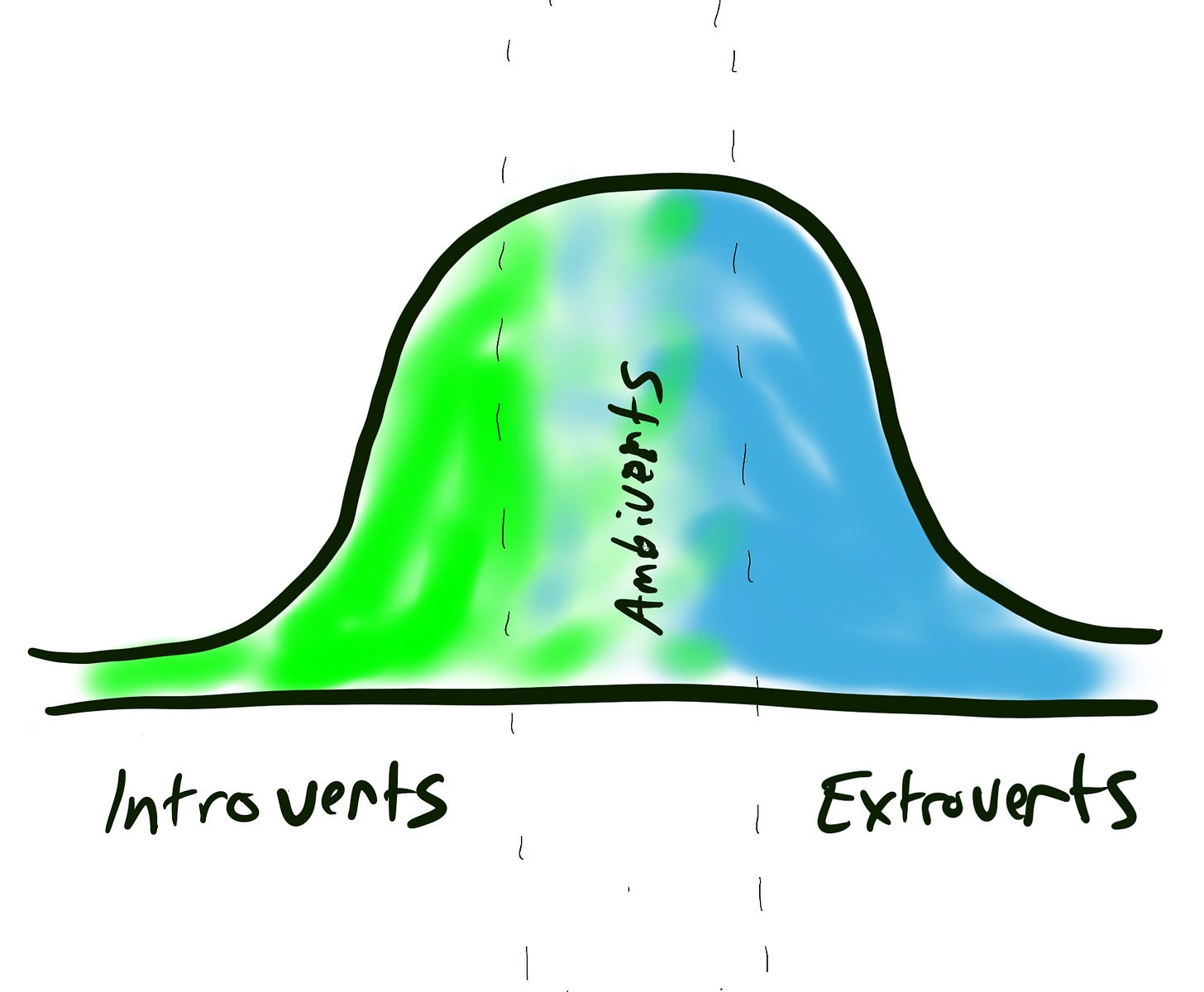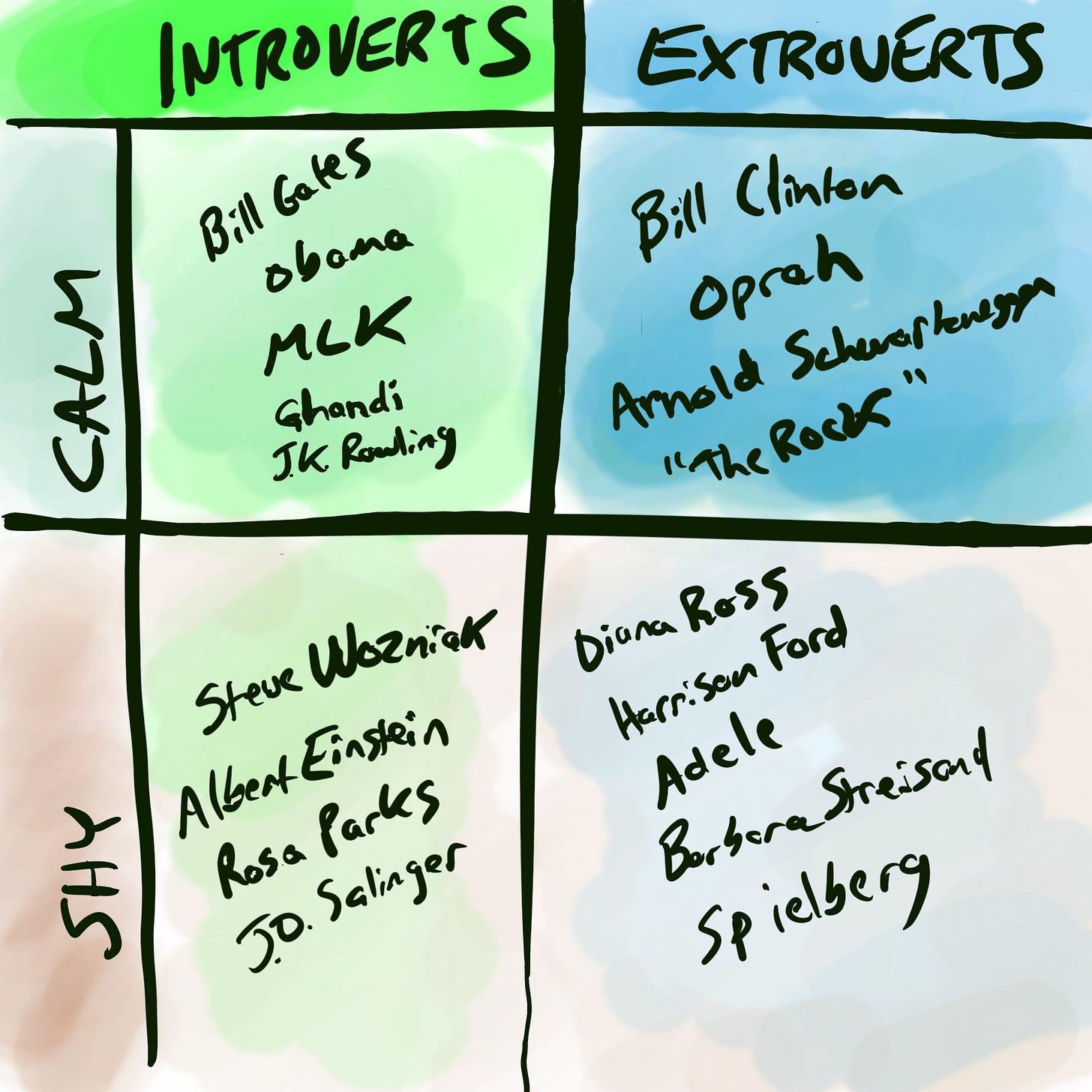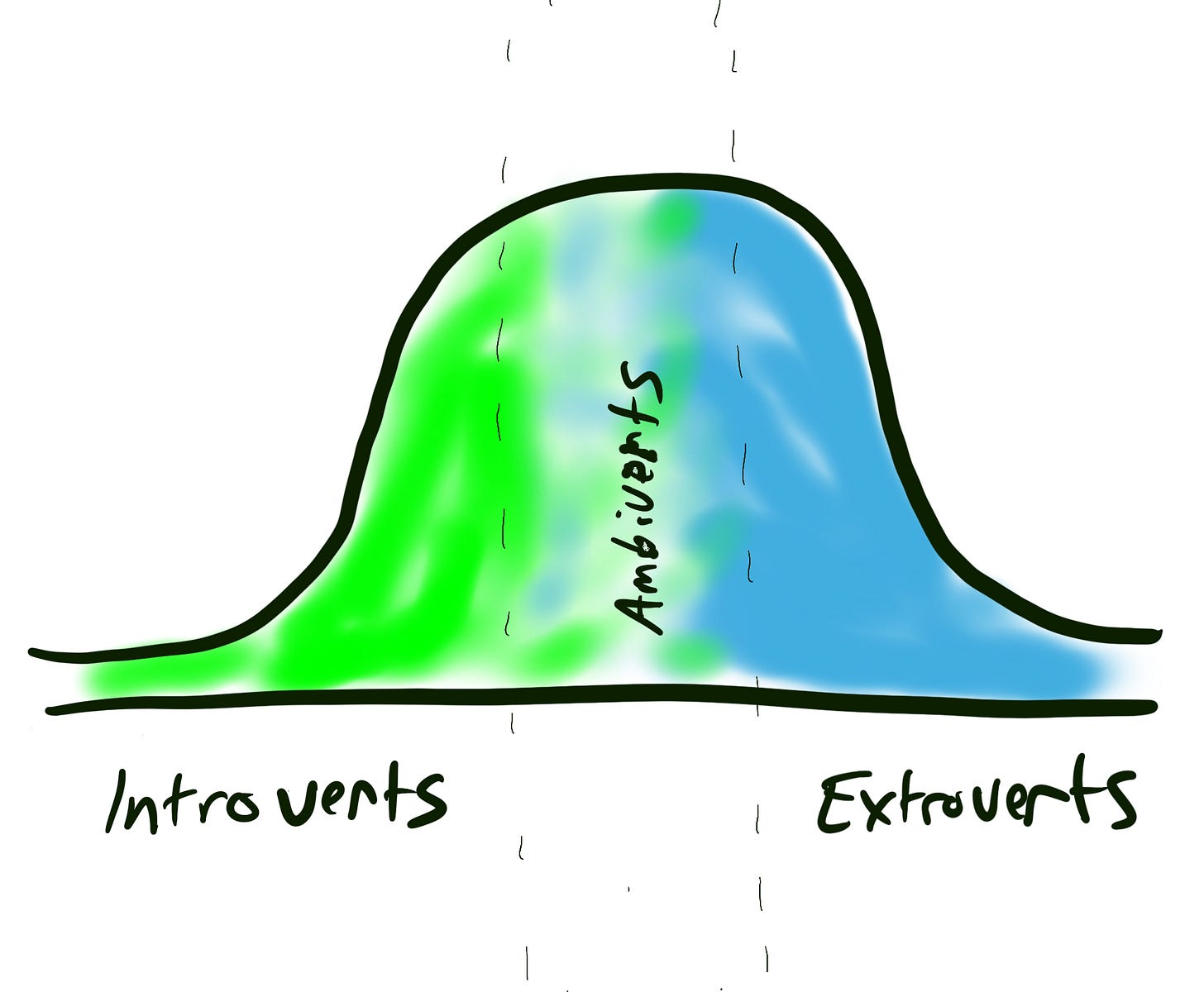#2 - What even is an introvert?
Quiet? Yes. Shy? Maybe.
read time: 5 minutes
Today at a Glance
Idea: introverts are not necessarily shy.
Interview: with a powerful technical leader
Research: what even is an introvert?
Update: this week in PI
Introverts are not necessarily shy
Introversion is defined by where you draw your energy. Introverts find energy within themselves (“intro”), while extroverts are energized by interactions with others (“extro”).
Shyness, on the other hand, is about discomfort in social situations. It involves a heightened concern with how others perceive you, often leading to avoidance or withdrawal from social settings. Unlike introversion, shyness is a separate, distinct personality trait.
Introversion doesn’t inherently keep you from enjoying life. Once you understand where you draw your energy, you can learn to manage it effectively. Shyness—and in its more intense form, social anxiety—can, however, limit your experiences and prevent you from fully engaging in life.
This is why we see prominent, powerful introverts like Bill Gates, Barack Obama, and Martin Luther King Jr. who appear calm, confident, and even captivating in front of crowds, yet do their best work and recharge in solitude. Shy introverts thrive in solitude, honing their brilliance away from the spotlight, while shy extroverts channel their energy publicly (often at a cost to themselves). See Quiet by Susan Cain p. 37
It’s true that shyness often accompanies introversion. As Susan Cain notes:
“Many introverts are shy, partly as a result of receiving the message that there’s something wrong with their preference for reflection, and partly because their physiologies, as we see, compel them to withdraw from high-stimulation environments.” (p.38)
What’s challenging to untangle is whether an introvert withdraws because of social discomfort (shyness) or simply because they’ve run out of energy. Introverts tend to “run hot” in stimulating situations, quickly depleting their energy reserves. This exhaustion can sometimes feel like social anxiety, creating confusion about the cause.
With self-awareness, however, introverts can learn to manage their energy and resist the pressure to “keep pace” with extroverts.
Thoughts from a powerful technical leader
I interviewed my friend and former colleague, Jeff Cowan, for Powerful Introvert. We met 14 years ago at a local tech company, where I was unexpectedly introduced to his team as their new manager. Since the team hadn’t been involved in hiring me, this news “was not universally well received”—one of his colleagues even quit on the spot. It was my first stint as an engineering manager, a true trial by fire, navigating strong personalities on the team, a private equity takeover with consultants descending like “the Bobs” from Office Space, and a 100-year flood.
Jeff shared his experience as an introverted technical leader and how he’s grown and adapted over the years. He sees himself as much more capable now when it comes to meeting new people, engaging in conversations, or presenting to his peers—areas that were challenging for him in his younger years. He voiced a theme I’m hearing more and more, as introverts mature :
“I’d say I’m a little closer to the middle of the spectrum now, but I still have those days where I’ve had enough social interaction yesterday, so I’ll stick to my own activities today.”
Jeff views self-awareness as essential to thriving as an introvert. We discussed how introverts, while often more in tune with their internal state when alone, can sometimes lose touch with that awareness in high-stimulus environments like the workplace.
We commiserated over the open office layout—a nightmare for introverts—and reminisced about the glory days of individual offices. Not only did private offices boost productivity and strengthen relationships, but they also solved the perpetual struggle to find meeting rooms. Now, we feel like guinea pigs for space planners and architects.
These days, Jeff acknowledges and embraces his introverted side.
“It’s a lot about where you get your energy. Do you get your energy from groups of people, or more from being alone? … I really appreciate the aspects of my introversion. It allows me to sit, think more deeply, and have my peace.”
What even is an introvert?
As we’ve discussed, introversion is about where you draw your energy. We often have an intuitive sense of what this looks like:
Introverts
Often the quieter individuals in a room, perceived as reserved
Think before speaking, are rarely the first to talk or jump into discussions
Prefer to reflect on issues and ideas, taking time to consider decisions
Modest and humble, not inclined toward self-promotion
Don’t display high levels of outward energy
This can be confusing when introverts also exhibit characteristics commonly associated with extroverts:
Extroverts
Enjoy socializing and even attending parties
Enjoy public speaking
Can thrive in sales and leadership roles
Thrive in collaborative settings
Show enthusiasm for new experiences
Hot Tip: If you identify with some of these classic extrovert qualities and find that they tend to wear you out after a while, that’s your introvert side peeking through!
It’s also helpful to know that psychologists have found introversion and extroversion follow a bell curve distribution:
There are relatively few people who are extreme introverts or extreme extroverts; most of us fall somewhere in between. This explains why some counterintuitive statistics suggest that up to 50% of us identify as introverts.
So, with such a strong presence, why does a stigma against introverts—and a bias toward extroverts in leadership—still persist? That answer requires a bit of a history lesson, which we’ll save for another day.
Powerful Introvert Update
Today’s newsletter has been the primary focus this week. I’m asking huge favors of my friends to serve as guinea pigs for my initial podcast episodes, and I know it’s a lot to ask. I am learning tons on the fly: the podcast format, recording and editing software, and my interviewing skills. There are great synergies between the podcast content and the newsletter. I’m very comfortable writing, but polishing content for this kind of format is something new. It’s been a blast so far!
My current goal is to record, edit and post three episodes and three newsletters before approaching people outside my network. I want to demonstrate my commitment to this topic, as well as the level of quality and I intend to bring.
Here are some encouraging facts:
Only 6% of podcasts truly ”make it.”
Most podcasts don’t make it past episode 7. By reaching episode 8, your chances of success grow To 43%!
Reach 50 episodes and your chances grow to near 90%.
For many, it takes around 100 episodes and 2 years to reach real success.
To this I say, Huzzah!:
Have a great week. May there be peace on this Election Day, and in the coming weeks and months.
Best,
Greg






